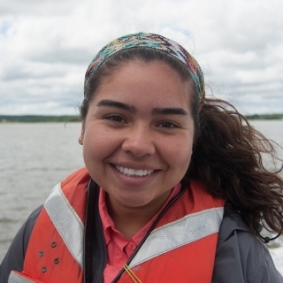Eight students will be presenting the summer work at the Ocean Sciences Meeting in March 2022!
Jamie Donley, University of Texas San Antonio
Class Year:
2017Mentor:
Cindy Palinkas, Ph.D.Project Title:
Examining the Record of Past Vegetation Communities at Jug Bay: A Sediment Geochronological Approach
Abstract:
Although species-rich and valuable ecosystems, which offer a vast amount of ecosystem services, tidal freshwater marshes have been increasingly threatened by relative sea-level rise and reduced sediment availability in the past couple of decades. The goal of this study, conducted at a tidal freshwater marsh in the upper Patuxent River (Jug Bay) is to determine how the vegetation community and sediment accretion rates in the marsh have responded historically to these threats. Seeds from Nuphar lutea, Pontederia cordata, Polygonum arifolium, Peltandra virginica, Rosa palustris, Leersia oryzoides, and Hibiscus moscheutos species were recovered from cores; however, evaluating changes in vegetation with time were limited by the number of seeds recovered, especially with depth in cores. Robust correlations between sediment accretion rates and annual mean sea level indicate that flooding patterns drive the delivery of sediment to the marsh surface. For example, greater variability in accretion rates were observed at infrequently flooded high-marsh sites, while lower variability was observed at low-marsh sites, which are more frequently flooded. This study represents a positive approach in better understanding potential future impacts of increased flooding associated with relative sea-level rise in tidal freshwater marshes, while highlighting challenges in establishing seed geochronologies.




